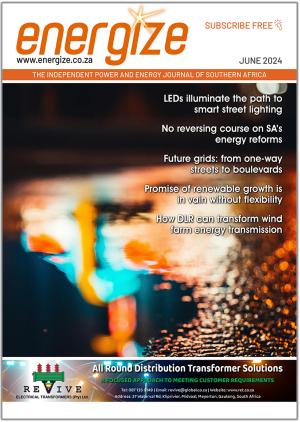by Roger Lilley, Energize
More and more voices are calling for the “State of Disaster” approach to South Africa’s electricity crisis to be stopped. There are better, more effective ways, they say, which are less susceptible to corruption.
This follows an announcement by President Cyril Ramaphosa during his recent State of the Nation Address that the Disaster Management Act would be used to remove unnecessary regulatory roadblocks in the acquisition of additional power to reduce the ever-increasing levels of load shedding the country has experienced over the last few years.
Ramaphosa wants to appoint an "electricity minister" and declare a State of Disaster to address the power shortages.
“We will use the state of disaster to get rid of unnecessary bureaucratic obstacles that stand in the way of urgently bringing new generation capacity onto the grid. We will use it to ensure continuity in the provision of critical services and supply chains, and to address the impact of load shedding on businesses and households”, Ramaphosa said.
The trade union Solidarity is reported to have launched an urgent application to have the decision reviewed and set aside by the High Court in Pretoria. The union says that since the current crisis was of the government’s own making, it shouldn’t be addressed in this way.
The biggest concern is that the Disaster Management Act allows Government to make decisions without the usual regulatory controls and parliamentary oversight.
And, since the crisis was not unforeseen or unmanageable prior to it becoming so serious, the Disaster Management Act would not be the correct approach. Rather, the Disaster Management Act was designed for sudden, unexpected and potentially disastrous events such as severe weather events such as flooding, droughts, tornadoes, earthquakes, and the like.
The concern has been raised that the Government has been delinquent in addressing a problem it knew of for over ten years. The state-owned power utility which has a virtual monopoly on electricity generation in South Africa has had a dozen CEOs in almost as many years. This has come about through Ministers meddling in the affairs of Eskom and the appointment of unsuitable, unqualified, and incompetent men to the position who would serve the various Ministers’ interests.
The electricity crisis, which has seen as much as 6000 MW of load being removed for many hours a day, has resulted in the closure of many businesses with the attendant loss of jobs, bringing severe hardship to many people – especially the poor – the very people this ruling party claims and promised to protect and uplift out of inequality, unemployment and poverty.
Was one of those “obstacles” the refusal by the Department of Environmental Affairs to issue a permit for heavy fuel oil-burning ship-mounted electricity generators to be moored at South African harbours to supply a few hundred MW of power into the grid?
And is it true that the wife of the current minister of energy has business interests in the company that would supply these ships? Would the Disaster Management Act enable the overlooking of such a blatant conflict of interest?
Furthermore, Eskom claims that additional generation injection at its end points is impractical. Rather, the utility offered private power producers the opportunity to lease land at some of its underperforming power stations and connect to the grid at the “correct” point.
Furthermore, the very government ministers who could have prevented the problem chose to vilify, rather than support, the latest CEO for asking for additional generating capacity to be made available from the private sector.
In making nonsensical, idiotic and irresponsible – not to mention untrue – statements about both Eskom’s generation capacity and the utility’s desire to overthrow the government, the one Minister who was authorised to acquire the extra generating capacity, refused, claiming that the power utility had 20 000 MW of capacity “lying idle”. And while those foolish comments were made publicly, the Minister responsible for Eskom, and ultimately the CEO’s employer, unapologetically failed to contradict such statements. And the President remained silent too.
The correct response by the President would have been the firing of these Ministers, not the imposition of another opportunity for dishonest politicians and their “friends” to raid the country further.
Although opposition parties have warned against the use of the State of Disaster approach, saying that it was a dangerous weapon in the hands of incompetent ministers, the President seems intent on pressing ahead with it, claiming that the Auditor-General would guard against any misuse of money earmarked to attend to the disaster.
This too is strange, since the Auditor General is incapable of ensuring that the financial affairs of South African municipalities are managed properly. How will the Auditor General manage to "keep an eye" on electricity procurement?
The President has promised that procurement would be transparent and that proper oversight would be applied. But proper oversight has not been applied, even with all the regulatory processes in place. “State Capture” under disgraced ex-president Jacob Zuma demonstrated that all too clearly.
But while Zuma may be out of power, many other dishonest, self-seeking people remain in place.
Send your comments to rogerl@nowmedia.co.za

















